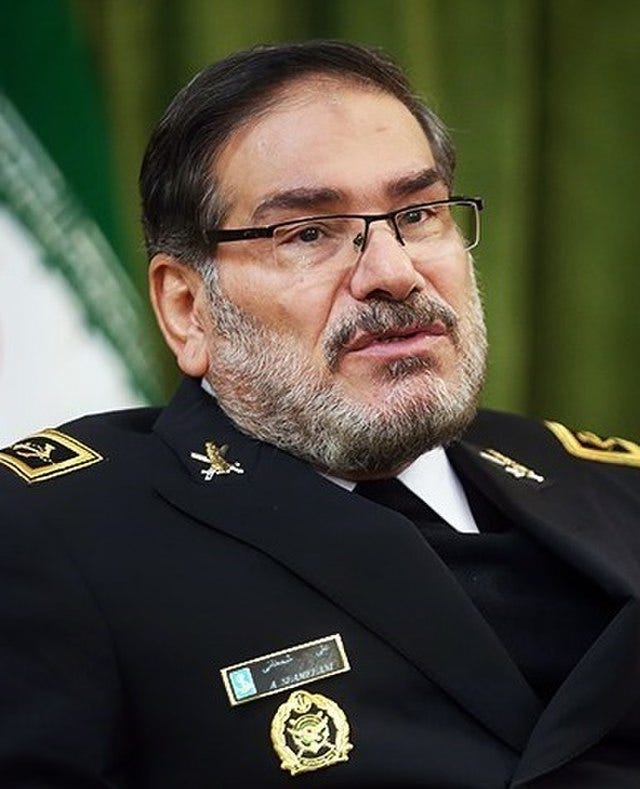The circulation of an April 2024 video showing the wedding celebration of the daughter of Ali Shamkhani, a senior Iranian official and former Secretary of the Supreme National Security Council, has provoked widespread reaction in Iran. Critics condemned the event, held in one of Tehran’s most luxurious hotels, as an extravagant celebration revealing the contrast between the country’s struggling population and its ruling elite. Officials and supporters of Mr. Shamkhani argued that the release of the footage, more than a year after the event, had political motives.
Ali Shamkhani is one of the Islamic Republic’s most influential figures, having served as Minister of Defense, commander in both the Revolutionary Guards and the regular Navy, and later as the head of the Supreme National Security Council for a decade. He currently sits on the Expediency Council, advises the Supreme Leader, and represents Ayatollah Khamenei in the Defense Council. The wedding of his daughter, held in Farvardin 1403 (April 2024) at the Espinas Palace Hotel, reportedly cost around one billion and four hundred million tomans, according to Iranian outlets such as Arman Melli and Faraz. This amount—roughly equivalent to the earnings of an average Iranian worker over many years—immediately drew public scrutiny when details became public.
A short video circulated online showing Mr. Shamkhani escorting his daughter down the aisle, with his daughter’s hair and shoulders largely uncovered while wearing a white wedding dress. Many of the women attending wore loose or minimal hijab, which critics say is at odds with the government’s efforts to strictly enforce veiling laws. Officials close to the family, however, say the footage came from the women’s section of the celebration, where clothing restrictions would not be in force given the separation of male and female guests.
Supporters of Mr. Shamkhani insisted the leak was politically motivated. Some claimed that factions inside the regime were using private footage to undermine him after his recent return to prominence. Mahdieh Shademani, daughter of a slain IRGC commander, called the affair a “Mossad project,” arguing that after failing to assassinate Shamkhani physically during the June war, when he was wounded and rumored to have been killed, his enemies sought to assassinate his character. The Basij-linked Student News Agency acknowledged that broadcasting the video breached privacy but still demanded that Mr. Shamkhani respond publicly. Political activist Saeed Shariati observed that the former national-security chief had little ground for complaint in a system that routinely leaks private videos and coerced confessions, writing that Shamkhani was complicit in the very apparatus now targeting him.
Ezzatollah Zarghami, the former Minister of Cultural Heritage, commented on the issue, writing: “The gathering was a private and completely women-only ceremony. The bride’s father, following his tribal custom, while keeping his head down, placed his daughter’s hand in that of the groom.”
Mehdi Mohammadi, an advisor to Mohammad Bagher Qalibaf, described it as a form of “yellow assassination” of government officials.“The yellow assassination of state officials, especially those who serve as the country’s main pillars in the fight against Israel, is an essential part of the current war. If we look closely, it also provides a shortcut to identifying the networks surrounding the regime.”
Shamkhani himself responded for the first time to the controversy surrounding the viral video of his daughter’s wedding ceremony. Speaking on the sidelines of General Afshar’s memorial service, he told a Fars News Agency reporter:“My response to the recent uproar is the same as before: bastards, I’m still alive.”
The controversy revived long-standing questions about the extraordinary wealth of the Shamkhani family. His sons, particularly Mohammad Hossein Shamkhani, are major players in Iran’s oil and shipping sectors through a conglomerate known as Admiral Shipping Company, established in 2011. In August 2025, the U.S. Treasury Department sanctioned Mohammad Hossein Shamkhani and the company, describing it as a complex network of front firms moving Iranian and Russian oil and military equipment, with profits estimated in the tens of billions of dollars annually. The elder Shamkhani himself had already been blacklisted in 2020, and in 2022 Indian authorities seized an Admiral tanker carrying Iranian exports. These revelations reinforced public perceptions that the country’s ruling class lives by a different set of rules, enriching itself while ordinary people bear the brunt of sanctions.
The episode coincides with Mr. Shamkhani’s renewed visibility after Israel’s large-scale attack on Iran earlier in 2025, during which he was reportedly injured at his luxury home in Tehran’s affluent Pasdaran district. After recovering, he was reappointed by Ayatollah Khamenei to the Defense Council, marking his return to political prominence. For many observers, the wedding video became both a symbol of that comeback and a reminder of the wide gap between the lives of the Islamic Republic’s leaders and its citizens.
In a country grappling with inflation, unemployment, and repression, the video struck a chord. The image of the daughter of the Supreme Leader’s own representative celebrating in Western fashion without strict hijab, while thousands of women face prosecution for defying the government’s dress code, stoked a sense of injustice for many. Whether or not the leak was engineered by political rivals, it contributes to the view that the Islamic Republic’s elite enjoy impunity and privilege incompatible with the values they enforce on others. The wedding of Ali Shamkhani’s daughter thus became far more than a private family celebration. For many, it was seen as a reflection of Iran’s internal contradictions—between public morality and private indulgence, between proclaimed austerity and visible wealth, and between a state that demands sacrifice and officials who appear to live above the rules.



